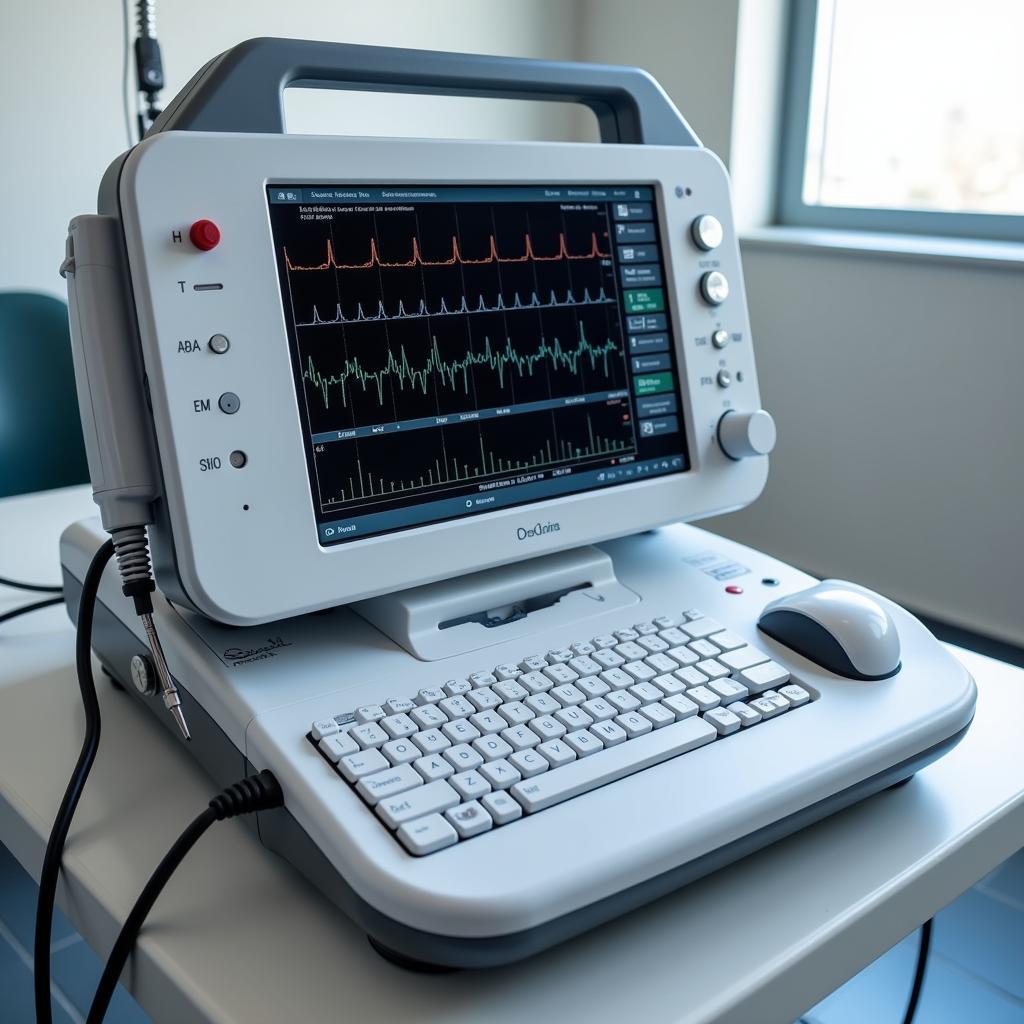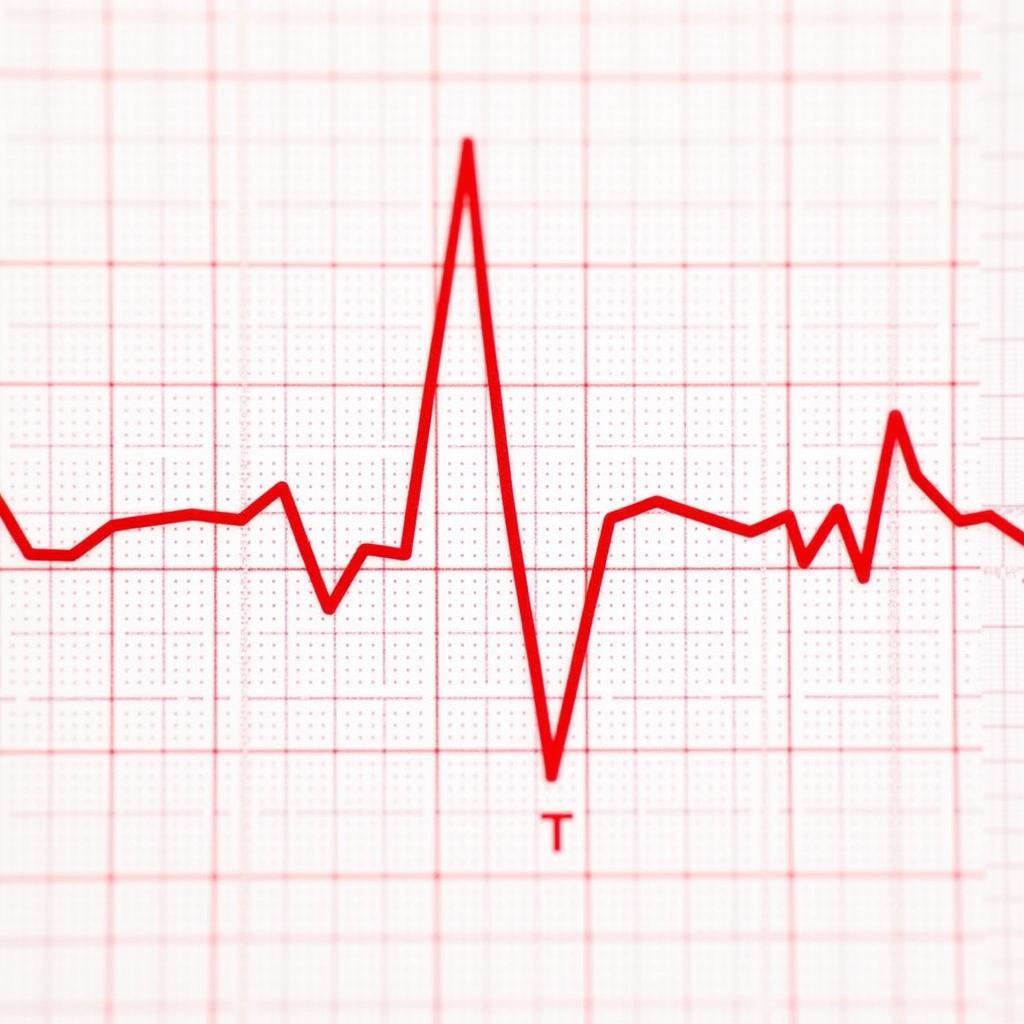The human heart is a marvel of nature, a tireless pump that circulates blood throughout our bodies. Its rhythmic beat, familiar to us all, is driven by a complex system of electrical impulses. Understanding these impulses is crucial for diagnosing and treating a variety of heart conditions. That’s where the electrocardiogram, often shortened to EKG or ECG, comes into play. This powerful Diagnostic Tool Used To Detect Electrical Activity In The Heart provides a window into the heart’s function, allowing medical professionals to identify irregularities and guide treatment decisions.
 Electrocardiogram Machine
Electrocardiogram Machine
Deciphering the Heart’s Electrical Language
The heart’s electrical system is responsible for coordinating the contractions of its different chambers. This electrical activity can be measured and recorded by an EKG. But what exactly does an EKG tell us?
The Waves of the Heartbeat
An EKG recording displays a series of waves that represent the different phases of the heart’s electrical cycle. Each wave corresponds to a specific electrical event, such as the contraction (depolarization) or relaxation (repolarization) of the atria or ventricles.
- P wave: This small, rounded wave represents the electrical activity as it spreads through the atria, causing them to contract and push blood into the ventricles.
- QRS complex: This spiky complex reflects the electrical impulse as it travels rapidly through the ventricles, triggering their contraction and pumping blood to the lungs and the rest of the body.
- T wave: This wave, usually smaller and more rounded than the QRS complex, shows the electrical recovery of the ventricles as they prepare for the next heartbeat.
By analyzing the size, shape, and timing of these waves, cardiologists can gain valuable insights into the heart’s rhythm and function.
 EKG Reading with Labeled Waves
EKG Reading with Labeled Waves
When is an EKG Recommended?
EKGs are incredibly versatile tools used in a variety of clinical situations. Your doctor might recommend an EKG if you experience:
- Chest pain: An EKG can help determine if chest pain is caused by a heart attack or another heart-related issue.
- Heart palpitations: If you feel like your heart is racing, fluttering, or skipping beats, an EKG can help identify the cause.
- Shortness of breath: Difficulty breathing can be a sign of heart failure or other cardiovascular problems, and an EKG can provide valuable information.
- Dizziness or fainting: These symptoms can sometimes be related to irregular heart rhythms, which an EKG can detect.
In addition to these scenarios, EKGs are often used during routine physical exams, before surgery, and to monitor the effectiveness of certain heart medications.
Types of EKGs and What to Expect
There are several different types of EKGs, each tailored to provide specific information about the heart’s electrical activity:
- Resting EKG: This is the most common type of EKG, performed while you lie still on an examination table.
- Stress EKG: This test involves monitoring your heart’s activity while you exercise, typically on a treadmill or stationary bike.
- Holter monitor: This portable EKG device is worn for 24 hours or longer to record your heart’s activity throughout the day and night.
- Event monitor: This type of monitor is worn for a longer period and is activated when you experience symptoms.
Regardless of the type of EKG you undergo, the procedure is generally painless and non-invasive. Small, sticky electrodes are placed on your chest, arms, and legs to detect your heart’s electrical signals. These signals are then amplified and recorded by the EKG machine, producing the familiar tracing of waves.
Interpreting the Results: A Collaborative Effort
While an EKG is a powerful tool, it’s important to remember that it’s just one piece of the puzzle when diagnosing heart conditions. A cardiologist will carefully analyze your EKG results, considering your medical history, symptoms, and other diagnostic tests.
If you have any concerns about your heart health, don’t hesitate to reach out to your doctor. Early detection and treatment are key to maintaining good cardiovascular health.
Expert Insight:
“EKGs are the cornerstone of cardiac diagnostics, offering a wealth of information about the heart’s electrical activity,” says Dr. Emily Carter, a leading cardiologist at ScanToolUS, “By understanding the nuances of EKG interpretation, we can diagnose and effectively manage a wide range of heart conditions.”
For expert guidance and support on all aspects of cardiovascular health, contact ScanToolUS today at +1 (641) 206-8880. Our dedicated team is located at 1615 S Laramie Ave, Cicero, IL 60804, USA. We’re here to help you navigate your heart health journey with confidence.

Pingback: Mastering Automotive Diagnostics with the ETEC Diagnostic Tool - Car Scan Tool